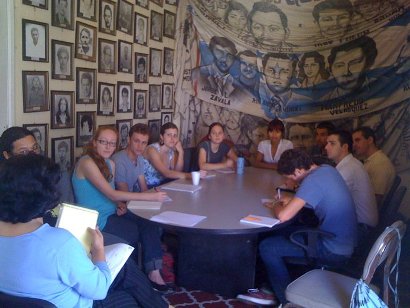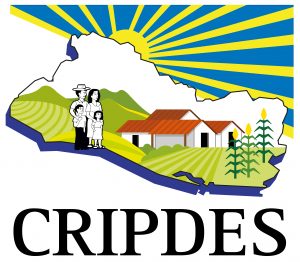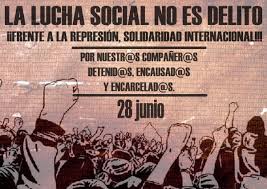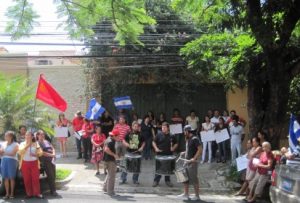International Meddling, Protecting Sovereignty, Rights for Youth and Women
Honduras: The People Against Empire
August 17, 2010
by Michael Ring
The gravitas of Bertha Oliva, the director of COFADEH (The Committee of Relatives of the Detained and Disappeared of Honduras), is built on 25 years of tireless work for human rights after having a family member disappeared by the U.S.-backed Honduran national security state. Since the 1980’s, Bertha and her COFADEH colleagues have publicly denounced state sponsored human rights violations, including the tragically painful disappearances of relatives.
Recently, the COFADEH director told a group of solidarity delegates that if there isn’t a team of international human rights workers on the ground in Honduras soon, activists of the country’s inspirational, non-violent people’s movement for democracy will be “cooked and served.” With these words, Bertha Oliva threw the emerging Honduras solidarity movement in the United States a direct challenge in the context of the U.S. and Honduran governments’ attempts to suppress the Honduran people’s struggle for an authentically democratic society.
Honduras lives a transformational moment. The June 2009 coup against President Manuel Zelaya was predictable in many ways. A rancher elected as a candidate of one of Honduras’ establishment political parties that have taken turns protecting the interests of the powerful in Honduras since the 1980’s, once in office, Zelaya began moving policies and programs that benefited the poor majority (e.g. raising the minimum wage). He established close relations with progressive governments across Latin America in search of support to improve conditions for Hondurans living in desperate poverty. When he moved to facilitate a grassroots movement’s call for consideration of a national assembly to rewrite the current Honduran constitution (which the elite had drawn up in the early 1980’s to solidify their hold on power), he crossed a line and the coup was on.
The ruling elite of Honduras (known as “The Ten Families” because of the extreme concentration of wealth and power these extended family networks hold) teamed up with the U.S. School of the Americas-trained military leadership to remove Zelaya, abducting him and flying him out of the country from the U.S. military base at Palmerola. These events were tragically unremarkable given the history of local elites and militaries teaming up with the U.S. government and international business to undermine popular efforts for social justice in the Americas since the U.S. established the Monroe Doctrine in the 1820’s.
What is remarkable about today’s Honduras is the sustained, non-violent, popular resistance movement (“La Resistencia”) that rejects the coup and continues the struggle for “La Constituyente,” a national constituent assembly to write a new, progressive constitution that will include all of Honduras’ historically marginalized communities. La Resistencia is dynamic and inclusive, bringing together campesinos, unions, students, indigenous communities, artists, feminists, LGBT activists and intellectuals in a fluid, horizontal, colorful explosion of mass creativity.
While the movement includes dedicated, seasoned activists like Bertha Oliva, the spark for this surprising turn in Honduran history hinges on the emerging organizers learning as they go. When delegates met with high school and college members of the National Youth Platform, the students spoke openly about their lack of organizing experience and the fear they have for their own safety. The coup government and the “continuation of the coup” Porfirio Lobo regime’s police and paramilitary structures have unleashed a vicious assault on youth in general and young resistance members in particular. In spite of the threats they face, the Youth Platform activists clearly articulated their role as protagonists in the formation of a new Honduras and shared plans to march publicly a few days later to challenge the government’s anti-youth policies (including Lobo’s plans to privatize high school education). They emphasized that despite the attacks against them, more and more young people are joining their efforts.
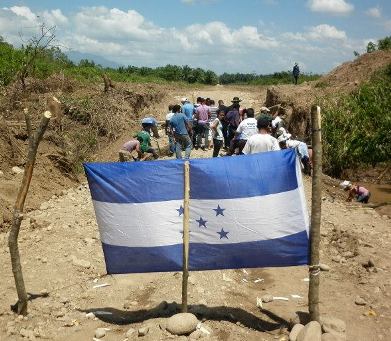
La Resistencia’s commitment to non-violence echoes some of the inspiring struggles of the last century, e.g. “Free India” from British rule, Equal Rights in the U.S. and People’s Power in Bolivia. A Honduran high school teacher and union activist speaking to delegates said, “The elite of this country want to eliminate us. We do not want to eliminate anyone. We believe Honduras is everyone’s country, including those who have had power historically. We are committed to a new national deal in which the fruits of our country are shared by all and not only the few historically privileged families.”
This commitment to non-violence has been met with tactical brutality designed to hide the Honduran and U.S. governments’ assault on this unexpected eruption of mass, nonviolent activism. Examples abound of U.S. and Honduran government inconsistency with official support for democracy and human rights. While one of Lobo’s ministers travels abroad to proclaim “advances” made in human rights, activists from resistance-affiliated groups suffer threats, assassinations and disappearances. During U.S Undersecretary of State Maria Otero recent visit to Honduras, Otero publicly congratulated Lobo on his work on human rights. The same week, an elite police force violently occupied the national university to shut down protests by students and employees. Days earlier, U.S. Ambassador Hugo Llorens expressed concern for the killing of Honduran journalists this year. Meanwhile, the U.S. has increased its financial assistance to the regime, advocated vigorously for Lobo’s government in diplomatic forums and established two new military bases on the Caribbean Coast.
Why is the U.S. government AGAIN on the wrong side of history and justice in Central America? Activist Doctor Juan Almendares explained that the U.S. government, local elite and multinational corporations have a plan for Honduras that includes huge concessions to international mining, bio-diesel, energy and infrastructure companies and the reinforcement of strategic U.S. military positions in the Caribbean (hence the two new bases). The Honduran people, their inspiring struggle and their dreams for a participatory, democratic, dignified society are in the way of the power players’ blueprint. Given the strategic interests at stake, as La Resistencia organizes to withstand this onslaught, people of justice everywhere have an opportunity and an obligation to respond to Bertha Oliva’s request for international activists to head to Honduras and stand alongside its courageous people’s movement.
For more information on the situation in Honduras, see: www.resistenciahonduras.net or http://hondurasresists.blogspot.com/

